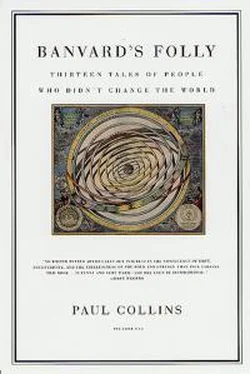William ransacked his absent employer's old files in the hope that a land deed might have Shakespeare's name on it, but it was no use. A search of stalls selling old papers and parchments turned nothing up. There was, however, a plentiful supply of the mysterious brown ink. One sleepy December morning in Bingley's office, Ireland cut the end off an ancient rent roll and used it to write up a lease agreement between Shakespeare and John Heminge. Unlike any attempt to mimic Shakespeare's own play manuscripts, a forged legal document was so mundane as to be utterly believable. At the bottom of the lease William traced out Shakespeare's signature from a published copy.
As a legal document, it needed a wax seal. William pulled a pile of neglected seventeenth-century deeds from the office files, sat down at a desk, and clicked open his penknife. Pressing the flat of the blade against the paper, he slid it across the back of the seal, paring away the wax in one whole piece from the parchment. Soon he had a small pile of authentic old wax seals ready to apply to documents, save for one problem: they had all dried out about two hundred years ago. He grabbed an ash shovel from the office fireplace, laid a few seals in it, and held it over the flaming hearth, hoping that the heat would melt the back of the seals enough to make them adhere again. But the desiccated beeswax crumbled, so he tried heating new wax and applying it to the back of the old seals like glue. To hide the difference in color between old and new wax, he darkened and dirtied the entire seal with some ash from the hearth.
By December 16, after two weeks of work, William was ready to unveil his newest discovery.
"I have a great curiosity to show you," he said as he entered his father's study.
--Yes? his father replied.
William drew out the lease from the breast pocket of his overcoat and handed it to Samuel.
"There, sir! What do you think of that?"
Samuel opened the parchment and read over it carefully. Then he examined the seal. William watched with mounting anxiety as his father carefully folded the document back up and handed it back to him.
"I certainly believe it to be a genuine deed of the time."
William pressed it back into his father's hand.
"If you think so, I beg your acceptance of it."
This document--the signature of Shakespeare --was what his father had so long wanted that he would have given half his library for it. Clearly moved, Samuel took a set of keys from his pocket and passed them to his son.
"These are the keys of my bookcase. Go and take from it whatsoever you please; I shall refuse you nothing."
William handed back the keys.
"I thank you, sir; but I shall accept of nothing."
His father rose from his chair, unlocked the case, and drew out a slim volume published by Will Stokes in 1652, The Vaulting-Master, or, The Art of Vaulting. Almost half of the book consisted of engraved plates, which William recognized as a sign of the book's rarity and value. His father knew this, too.
--Take it, he said. Please.
William had pleased his father at last.
Being a dutiful son, the junior Ireland continued forging documents for his father over the next few days. When asked how he had found them, he had a tale prepared. An older gentleman, informed of young William's interest in old books and papers, had invited him to a mansion where he had a large store of them at hand. Visible among these were a few--and perhaps, hinted William, many-bearing Shakespeare's signature. The gentleman, not wishing to attract attention to himself, was only to be known as Mr. H. The good nobleman proved to be a very generous friend indeed. On December 18, William returned home with an IOU from Shakespeare to John Heminge, of the Globe Theatre. On the 20th he unveiled Shakespeare's draft letter to his patron Lord Southampton; both documents were received with incredulous joy by his father.
William even added another authentic element to his ruse. One day, probably when he should have been at work, he sauntered over to the Parliament building to watch the proceedings from the visitors' gallery at the House of Lords.
While bewigged lords droned on below, William noticed an ancient and ragged
tapestry hanging on the back wall. Moving himself next to it, he stealthily tore off a swatch of fabric, which he pocketed while innocently continuing to watch the debate below. Now he had genuine old thread for tying up his rolled-up documents.
William pondered what his next discovery might be. He knew that readers were vexed by the possibility that their Bard might have been Catholic. There is, after all, that suspicious reference to Purgatory by the ghost of Hamlet's father. In an era when anti-Catholic legislation was favorably viewed by many, such papist skullduggery was improper in a national literary hero. And so, on Christmas Day of 1794, William presented his nation with a fine gift-Shakespeare's Profession of Faith, in which he disowns any Catholic sympathies. His father was awed by the import of this, so much so that he could no longer keep the discoveries secret. All holiday frivolity was to be set aside now.
--I must bring in reputable men to examine these papers, he said.
Young William went pale at this. To fool his father was one thing, but scholars? The waters were rising, and any minute he would be in over his head.
When Drs. Parr and Wharton arrived at the Ireland household, Samuel was waiting in the study for them. Young William stayed away from the room; he had no desire to witness what was about to happen. But finally the call came, and William entered his father's study almost paralyzed with terror. After a few formal questions about the origins of the manuscripts, the doctors warmly praised the young man for his discovery, at which William bowed his head--as much from fright as from modesty. Samuel then commenced the reading of the Profession of Faith:
I beynge nowe of sounde Mynde doe hope thatte thys mye wyshe wille atte mye deathe bee acceeded toe as I nowe lyve in Londonne ande as mye soule maye perchance soone quitte thys poore Bodye it is mye desire thatte inne such case I maye bee carryed toe mye native place ande thatte mye Bodye bee there quietlye interred wythe as little pompe as canne bee, ande I doe nowe inne these mye seyriouse moments make thys mye professione of fayth. ...
William agonized through each syllable. At the end of the reading, Dr. Parr spoke first.
"Sir, we have very fine passages in our church service, and our litany abounds with beauties; but here, sir, here is a man who has distanced us all!"
Dazed, William excused himself from the room and walked blindly into the dining room. The teenager leaned heavily against the window and pressed his face against the cold glass, his mind a mass of chaos.
He had become the country's Greatest Writer.
William now possessed something that no one suspected in him: literary genius. Over the following weeks he wrote at a desperate white heat. Legal documents, theater receipts, letters between Queen Elizabeth and Shakespeare; and finally a love letter from Shakespeare to Anne Hathaway, complete with a lock of hair and a sonnet attached:
Is there inne heavenne aught more rare Thanne thou sweete Nymphe of Avon fayre Is there onne Earthe a manne more trewe Thanne Willy Shakspeare is toe you.
...
The precious lock was quickly split up and set into rings for fashionable
Londoners. Words of the discoveries spread quickly, and so many visitors descended upon Norfolk Street that Samuel had to print up admission tickets.
But he basked in the attention; once a mediocre engraver and antiquarian book collector, he was now the possessor of the greatest literary discovery of the century. The rich and the powerful knocked on his door: the Prince of Wales came to visit, as did Prime Minister William Pitt and Poet Laureate Henry Pye.
Читать дальше











